
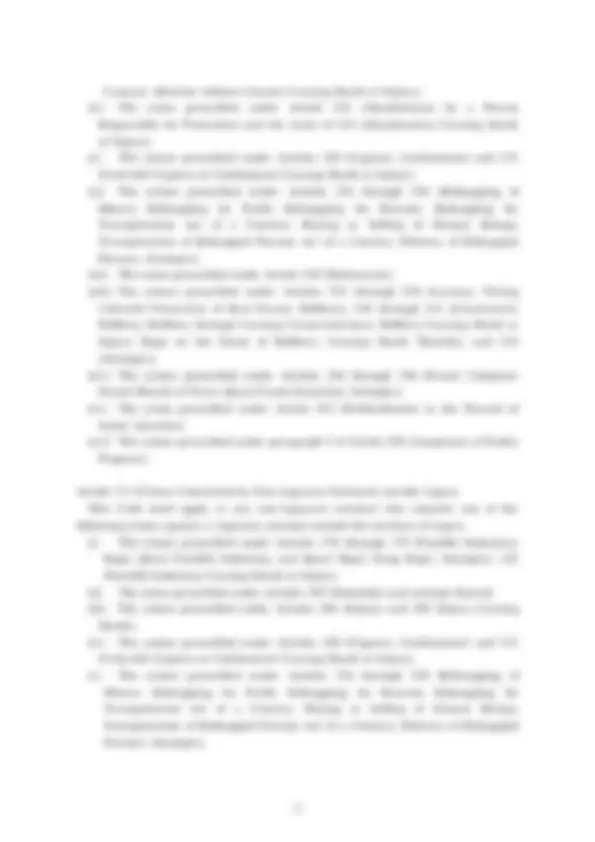
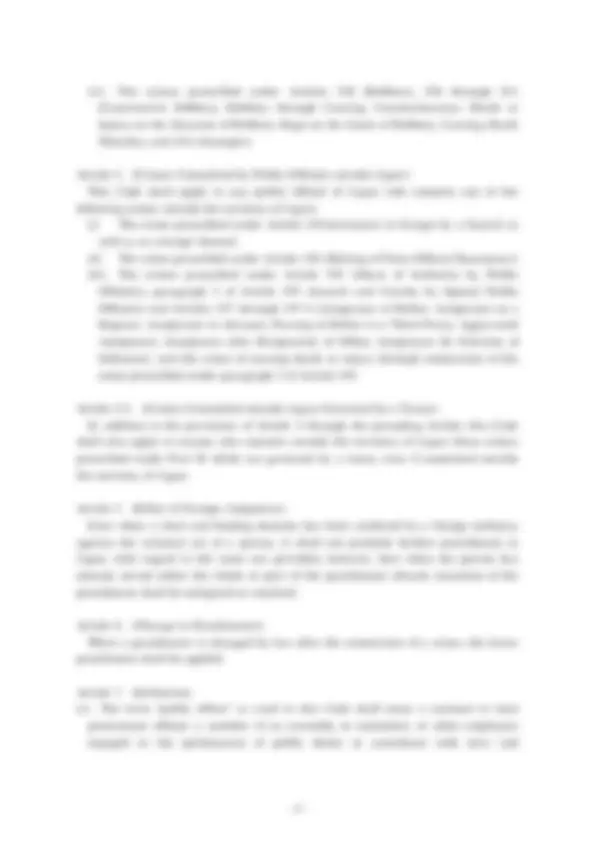
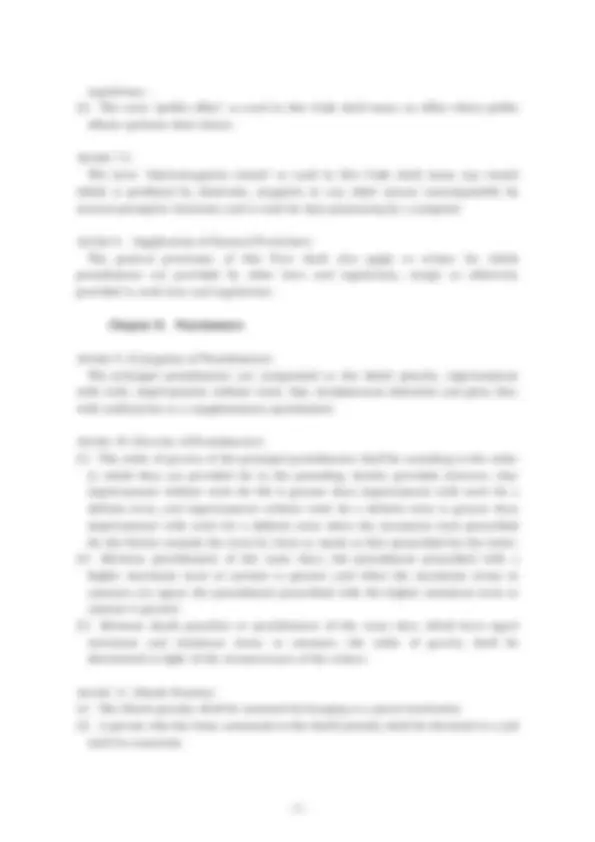
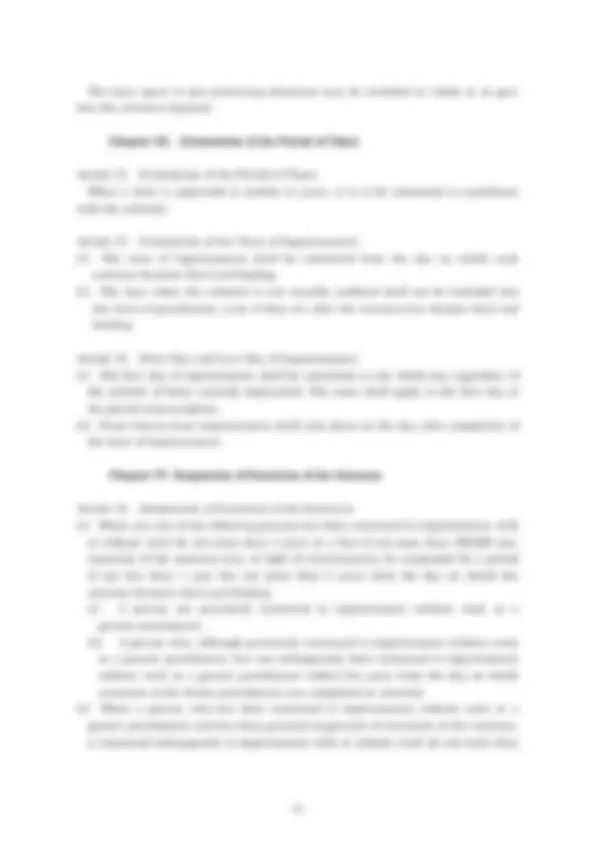
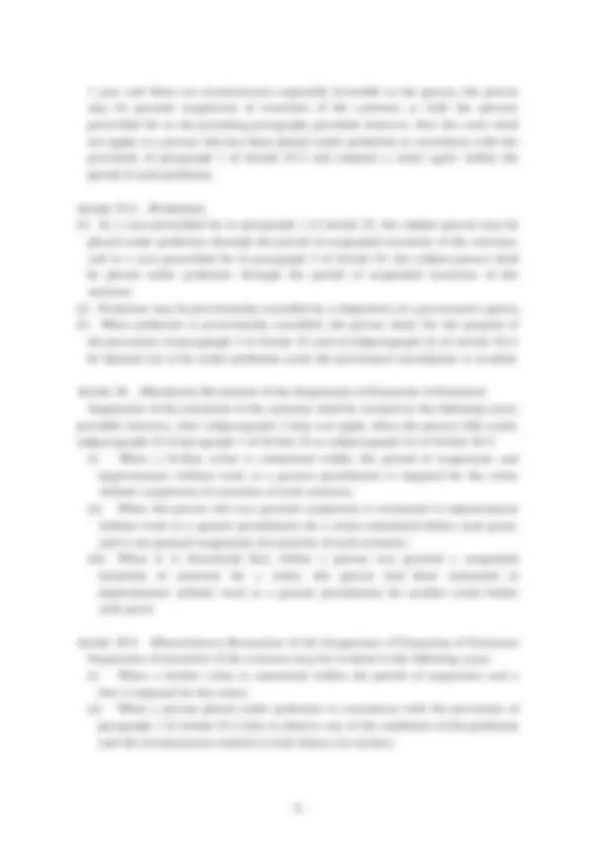
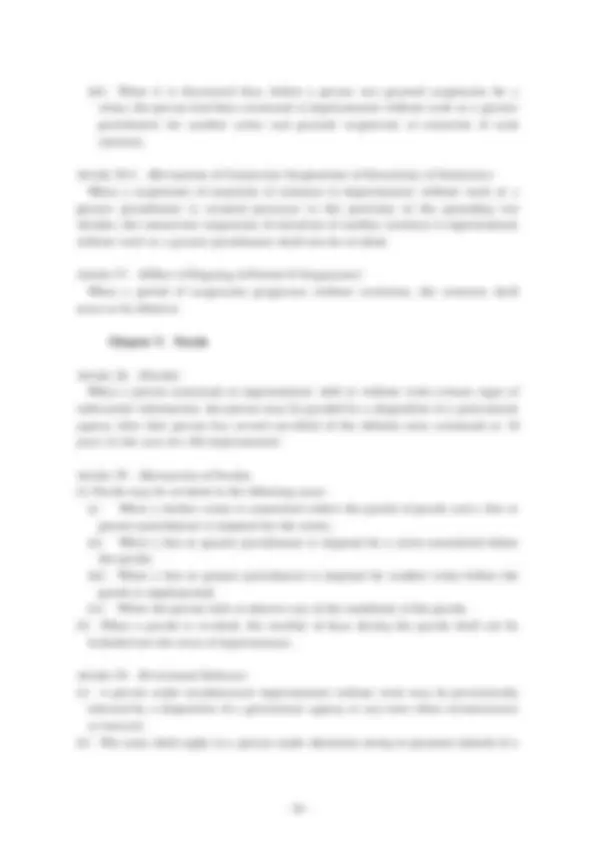
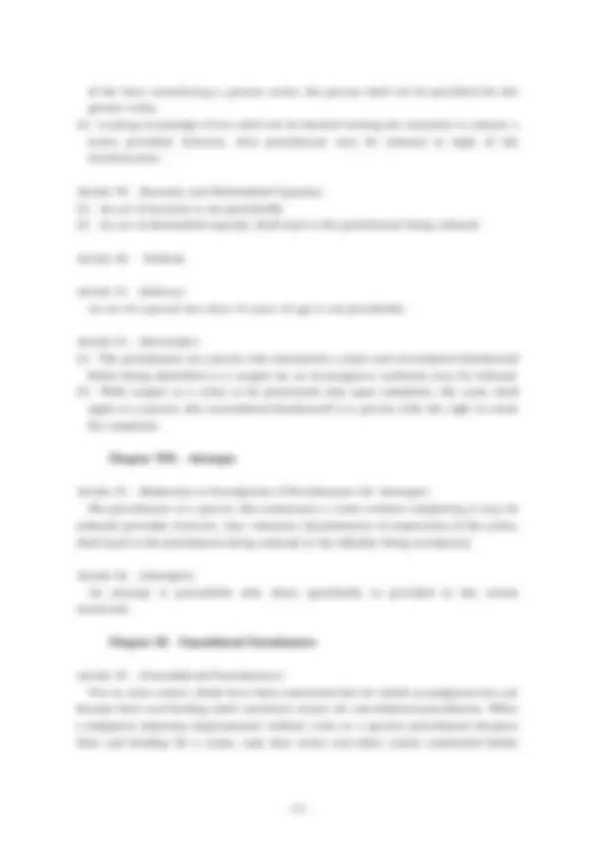
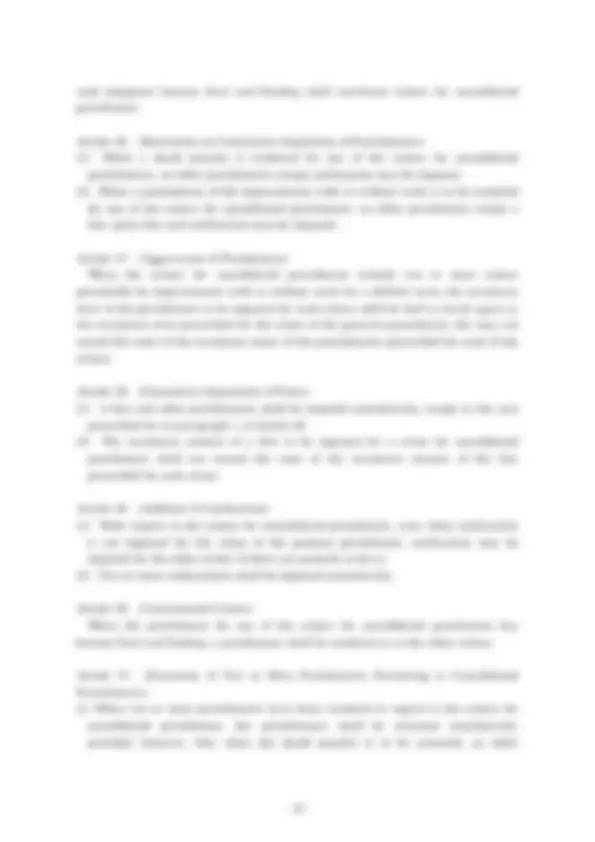
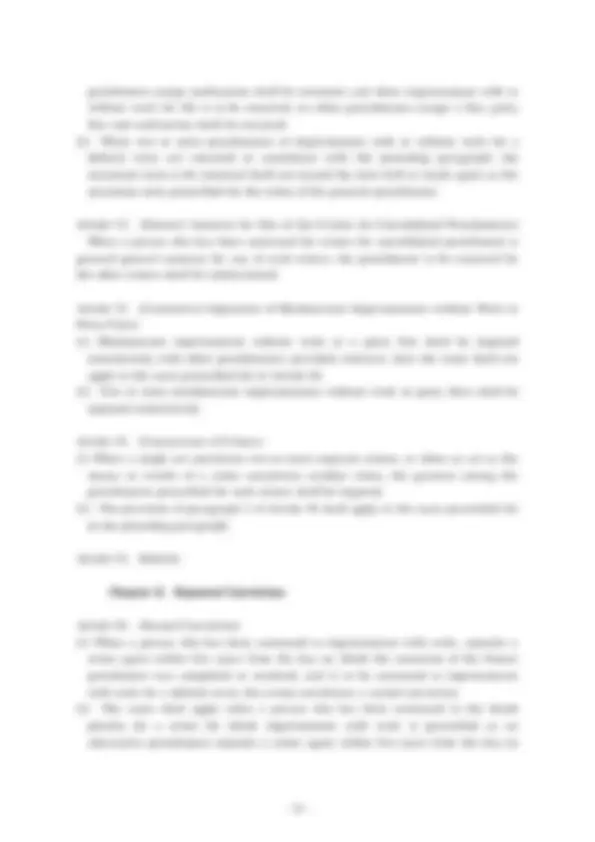
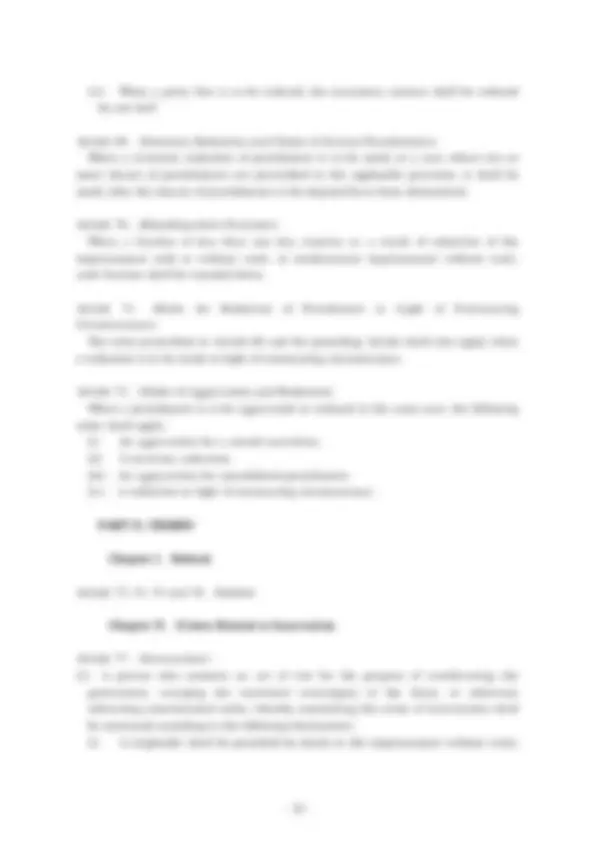
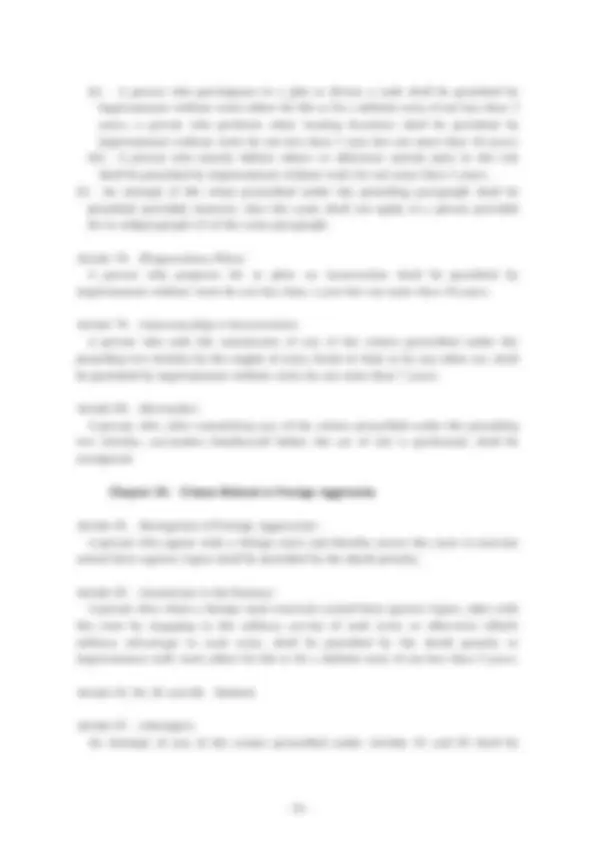
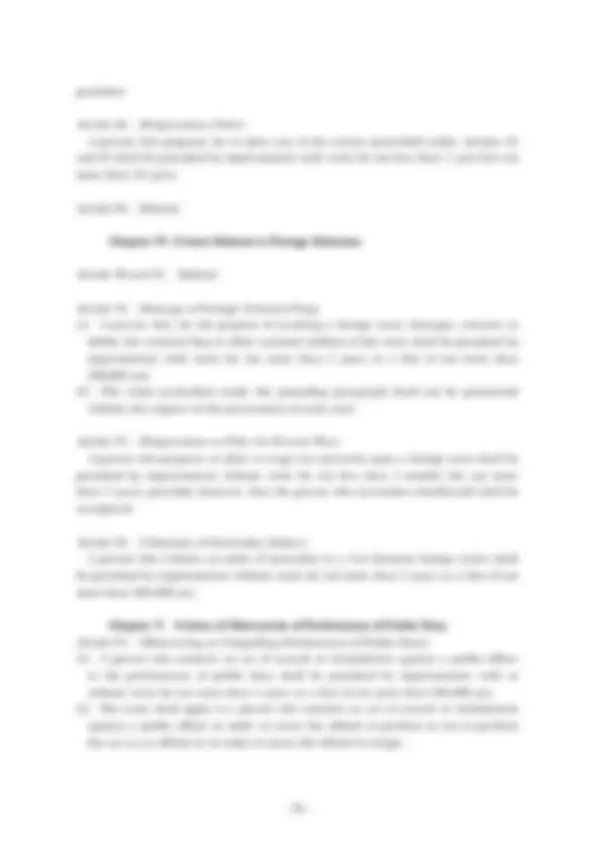
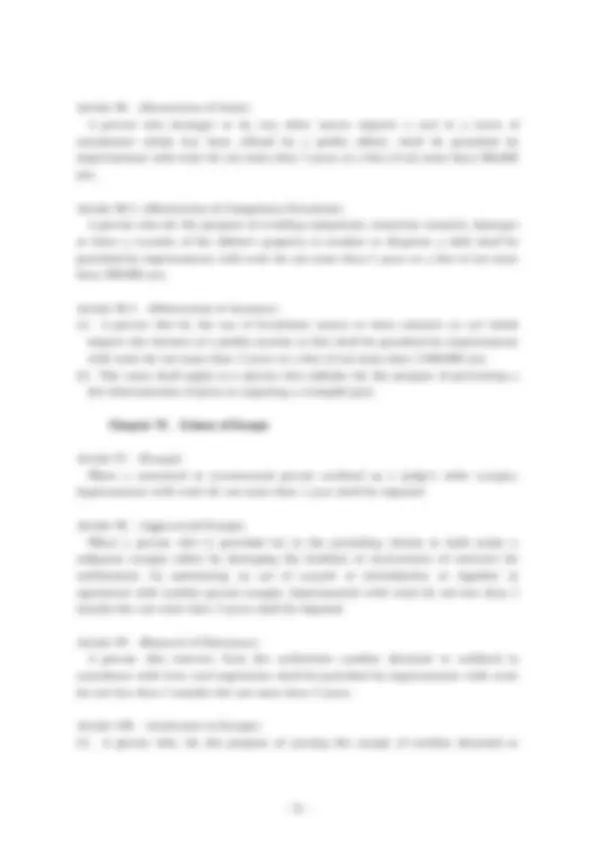
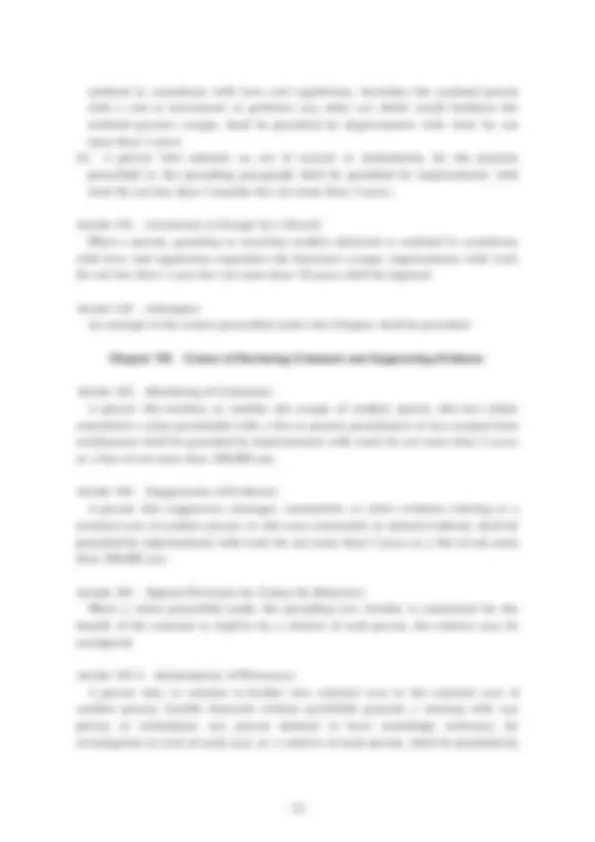
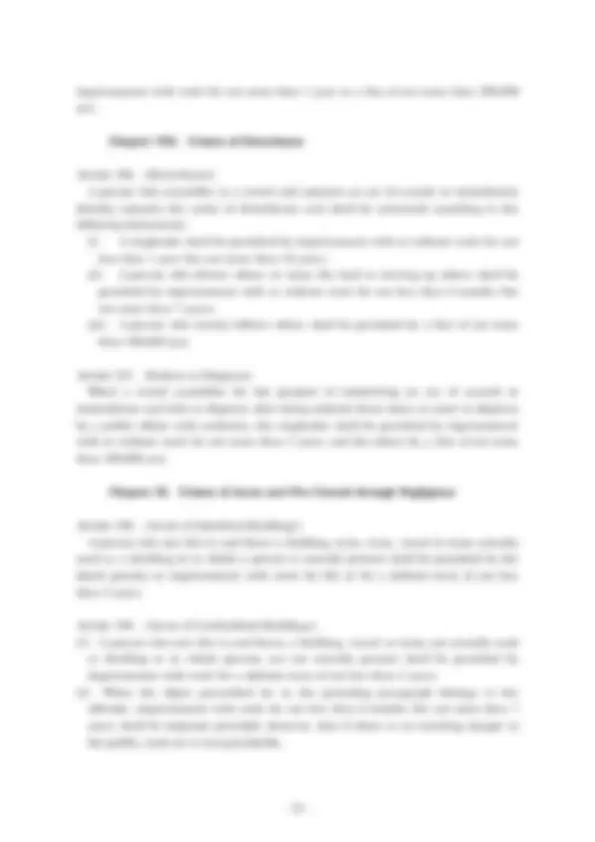
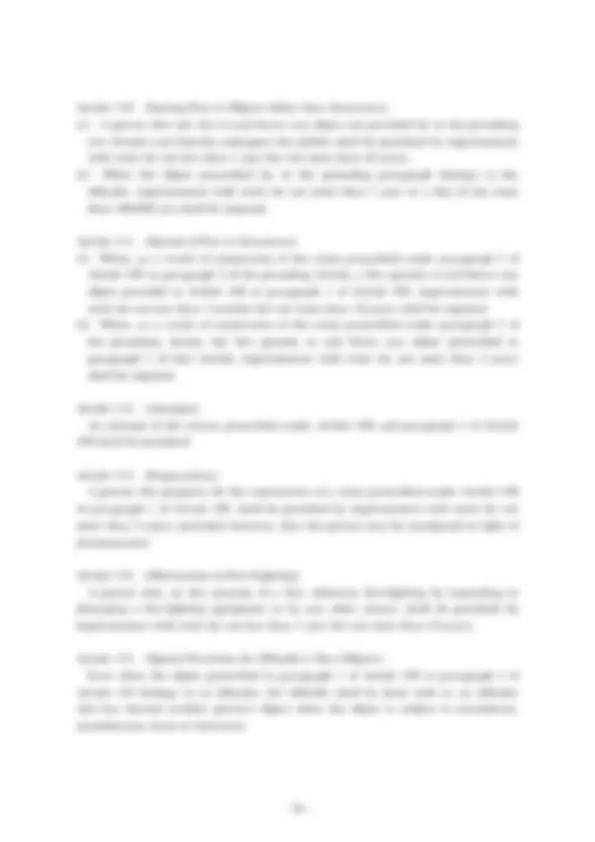
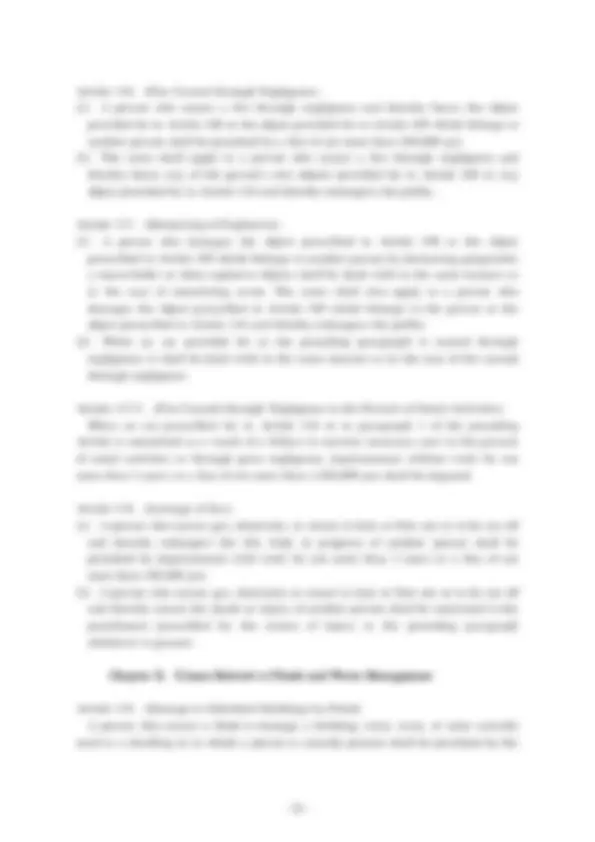
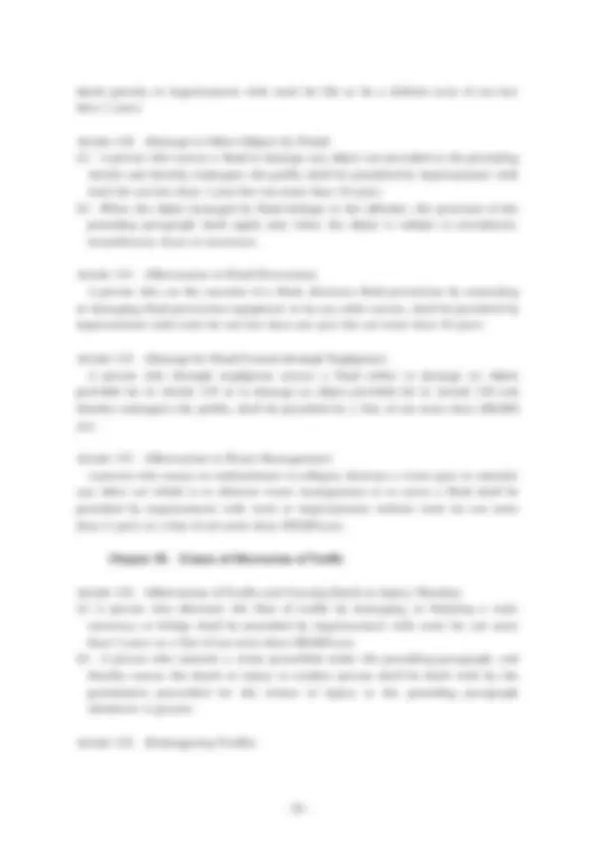
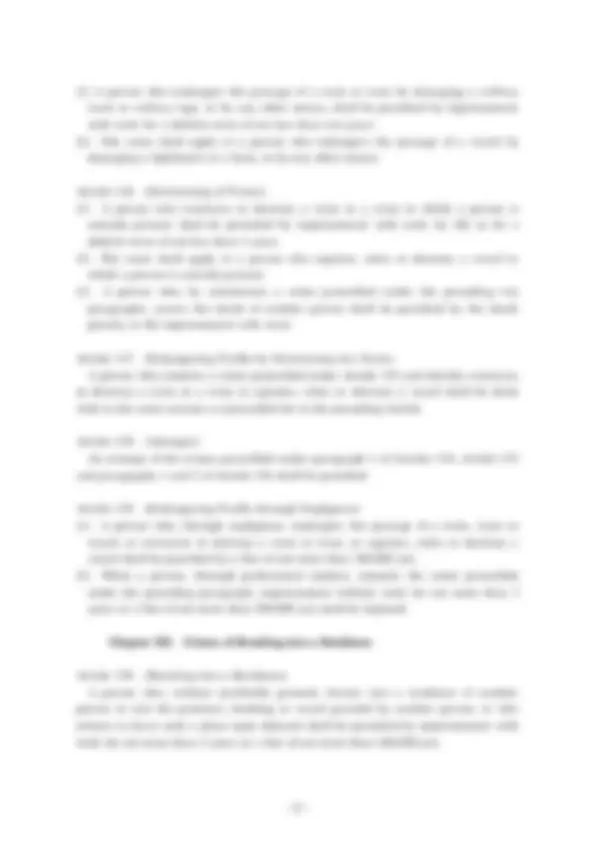
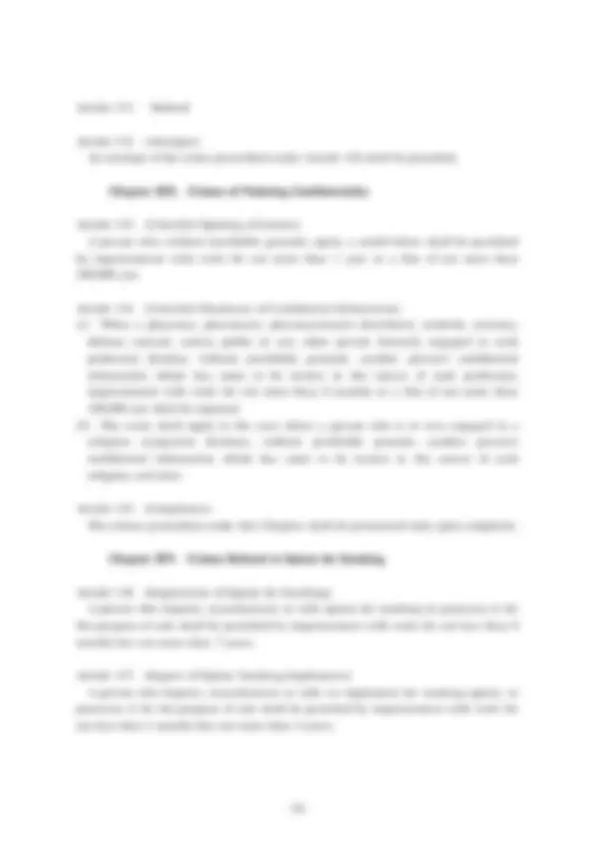
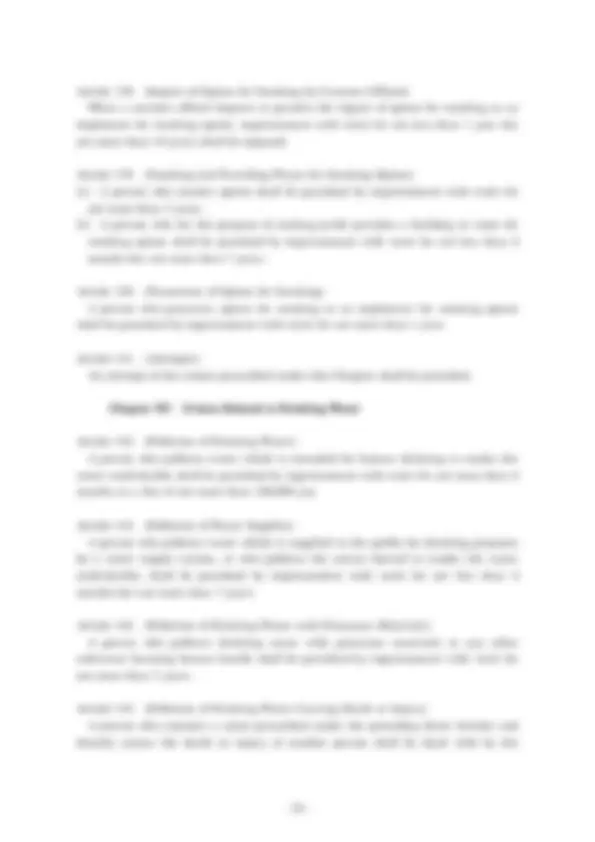
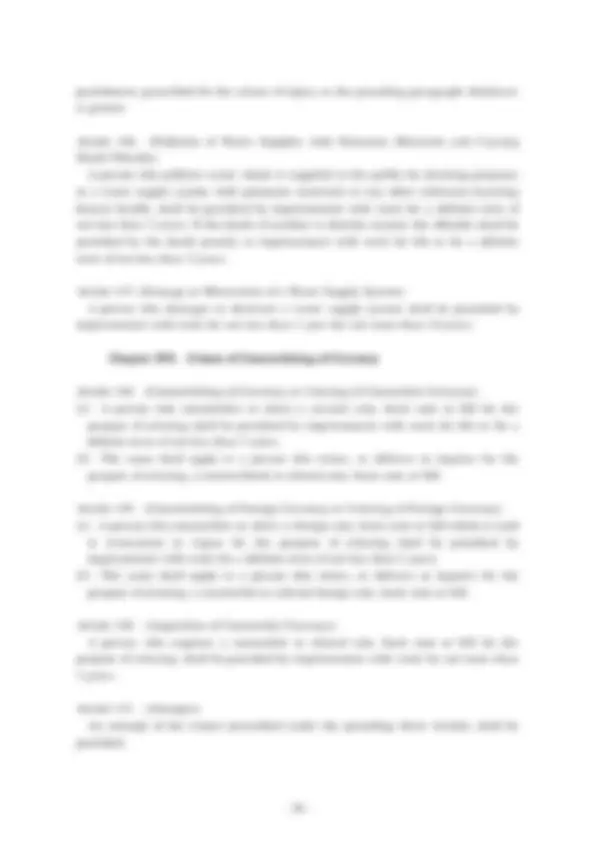
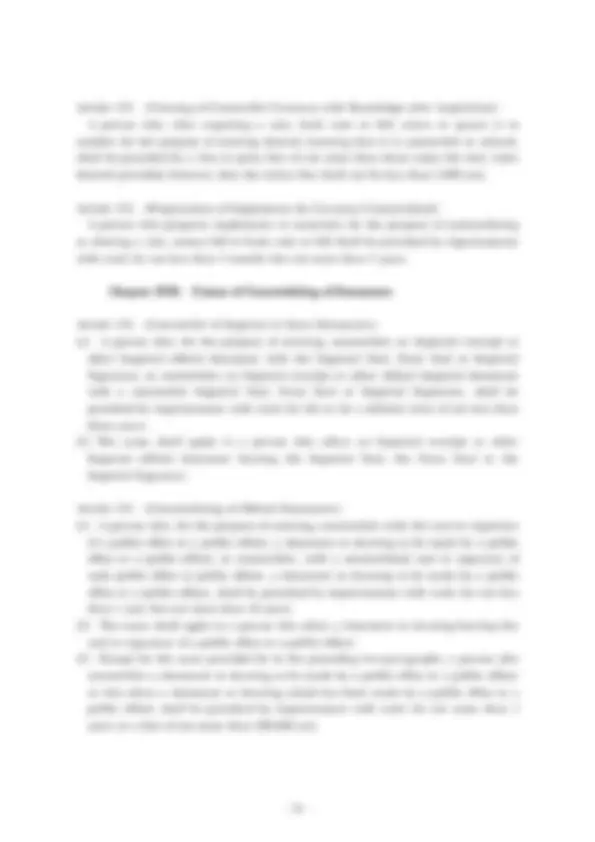
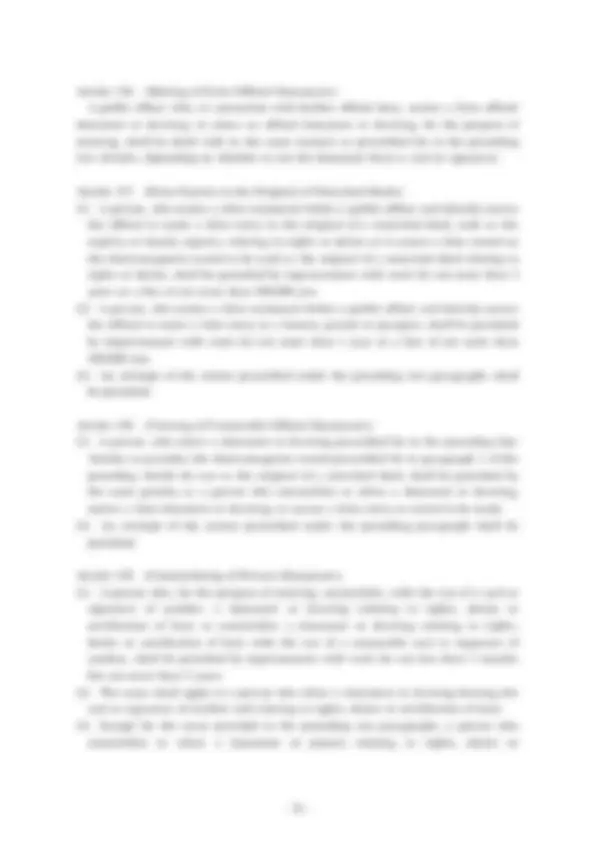
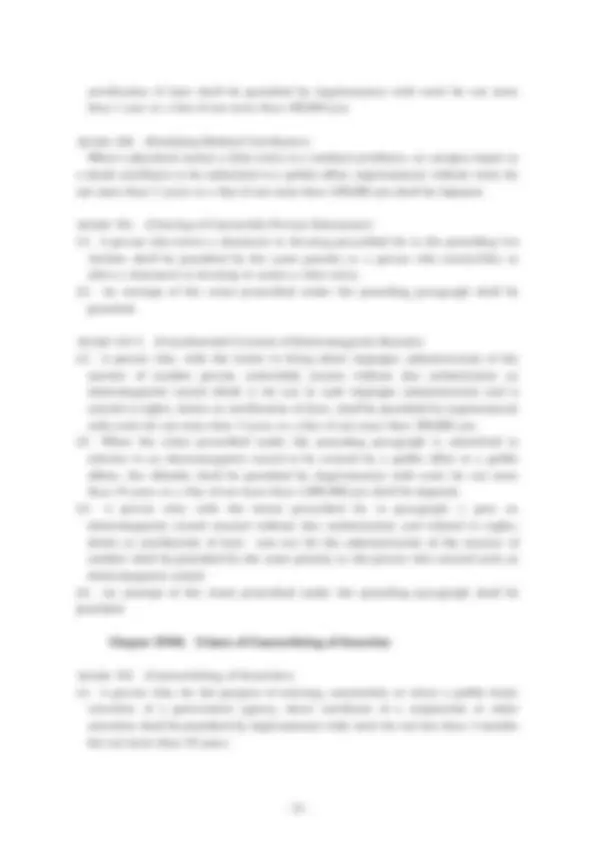
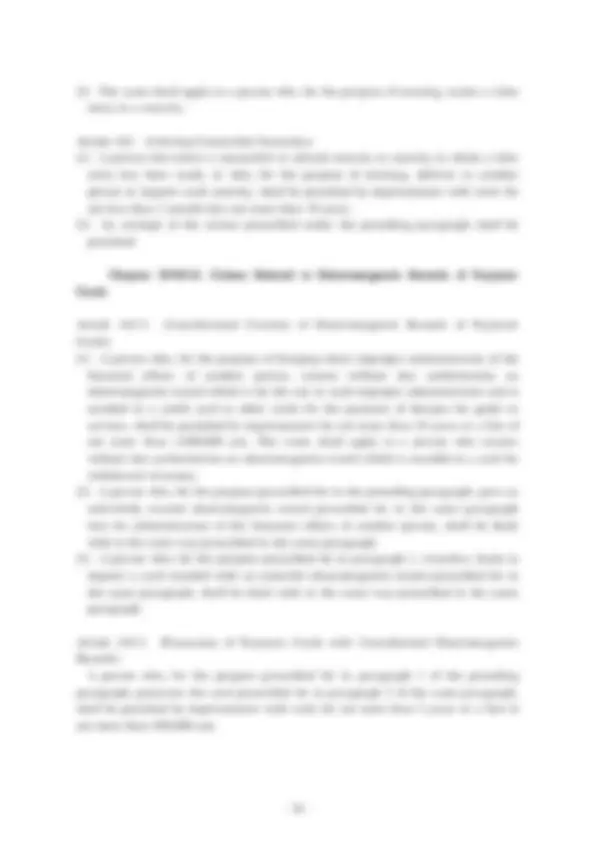
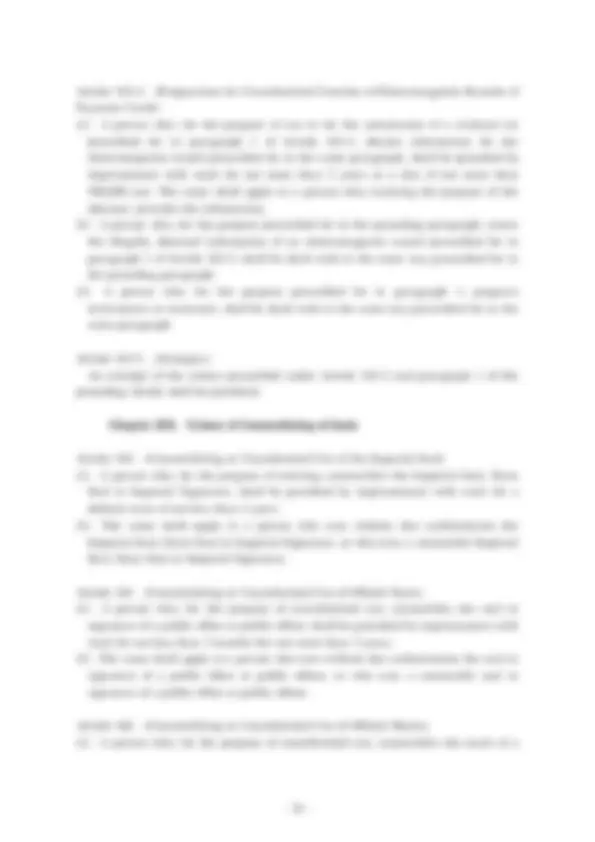
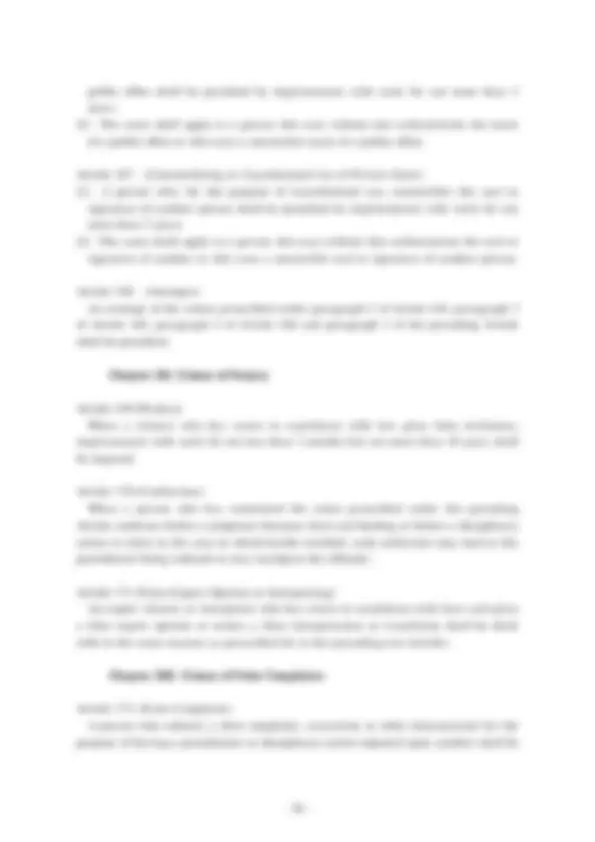
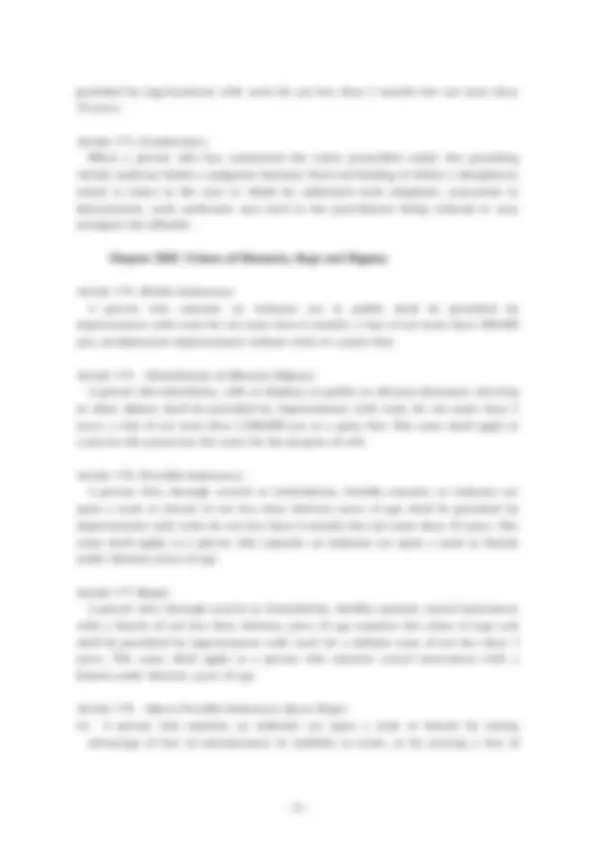
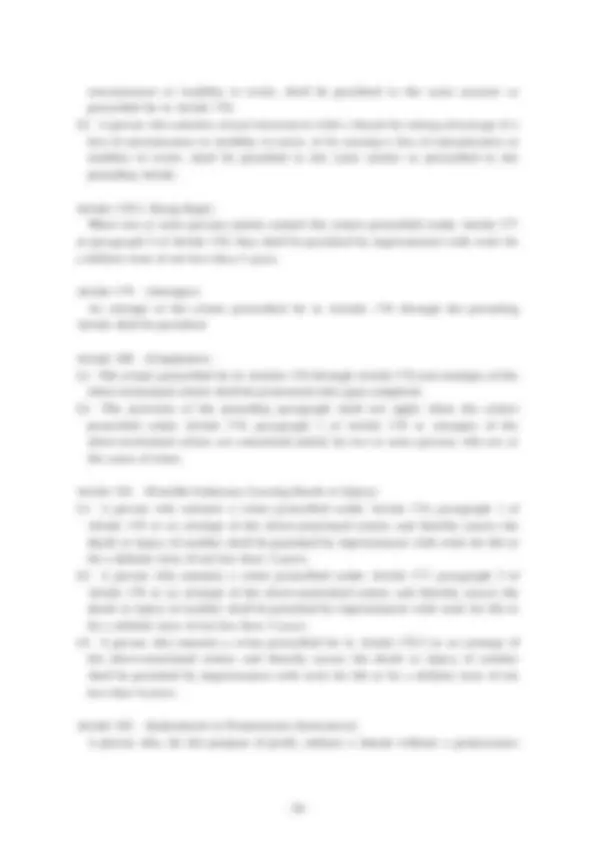
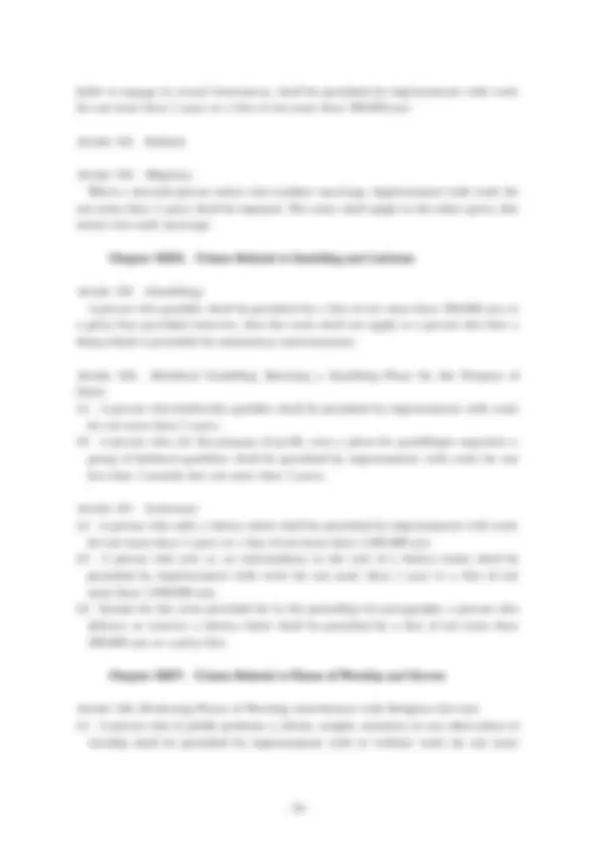
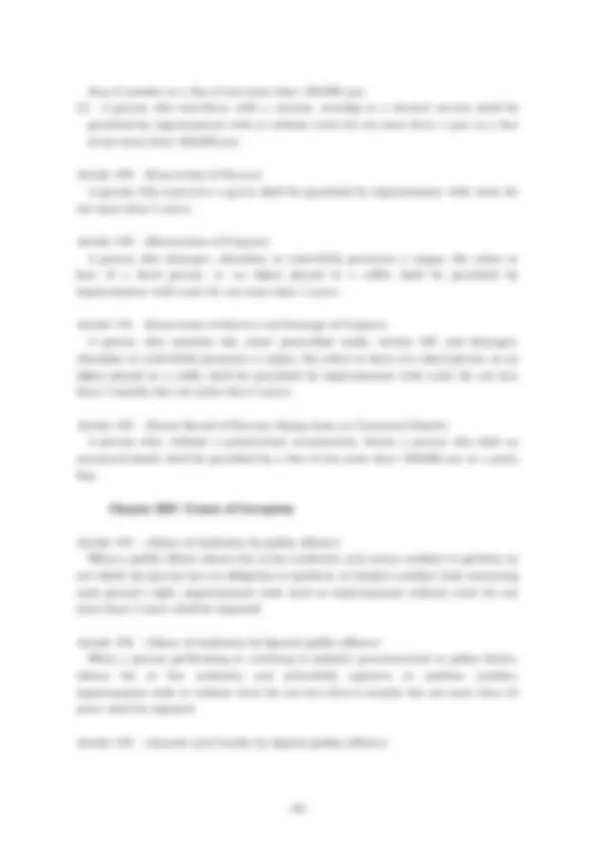
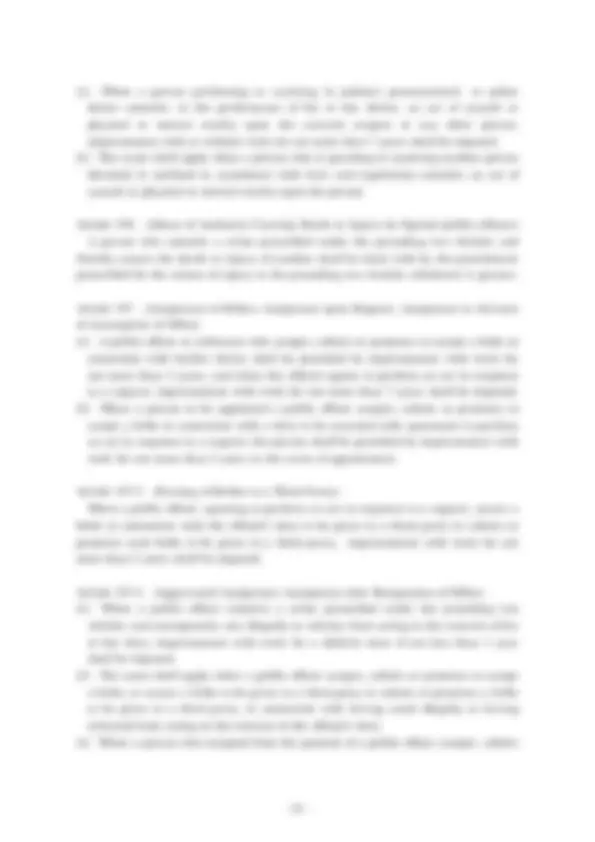
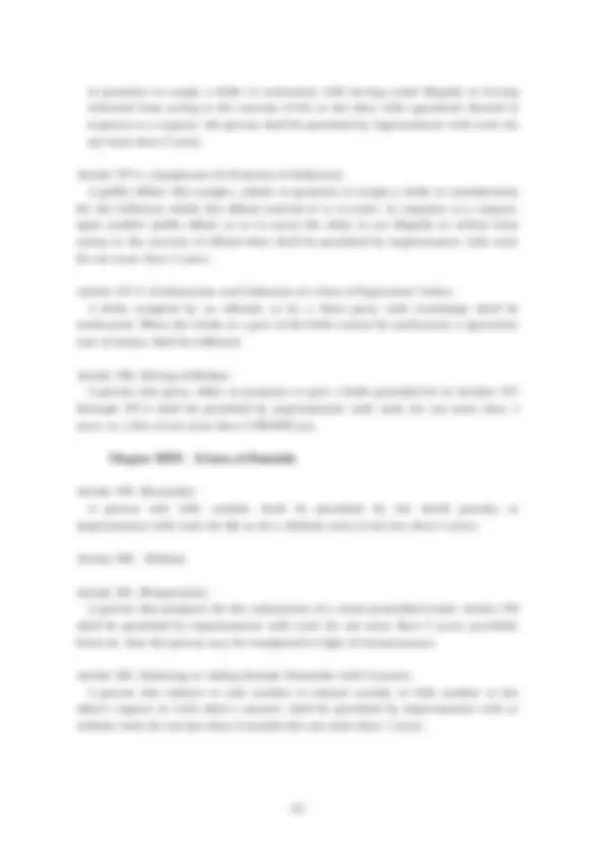
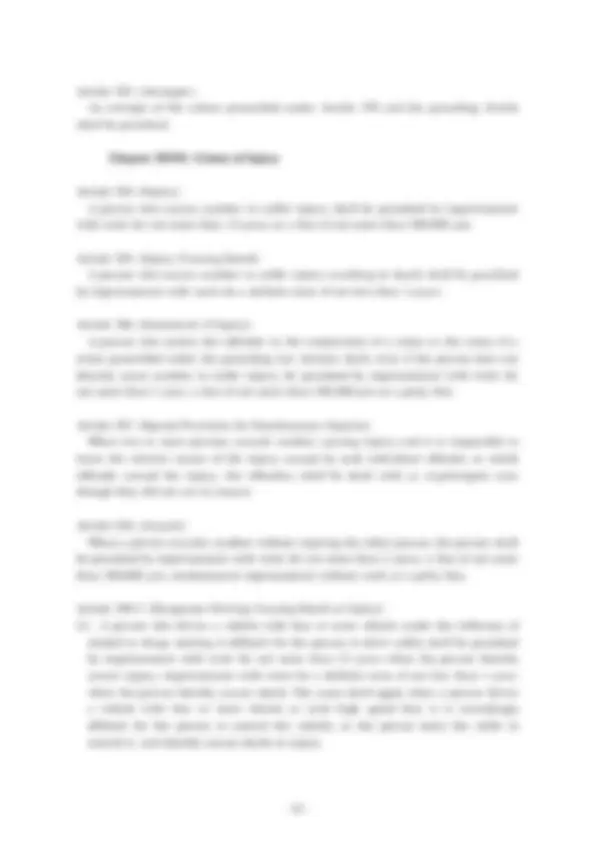
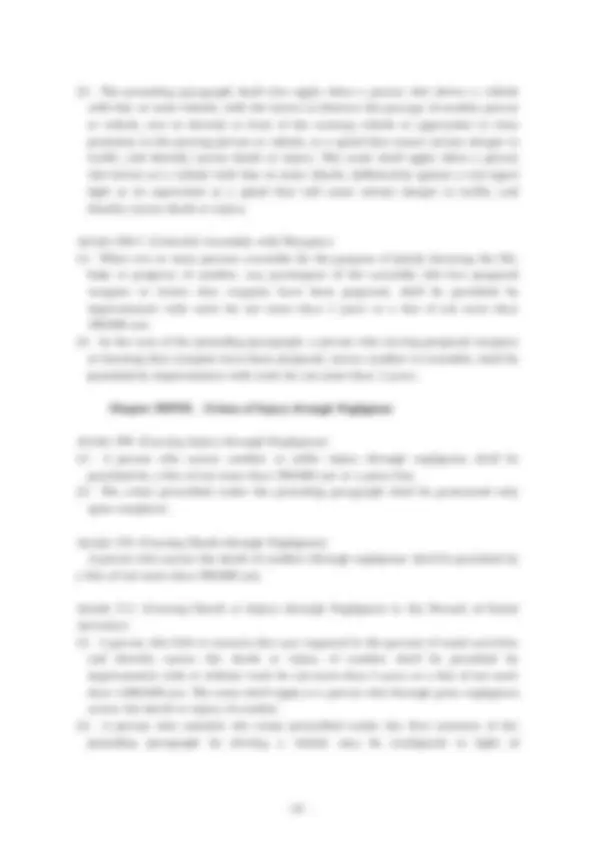
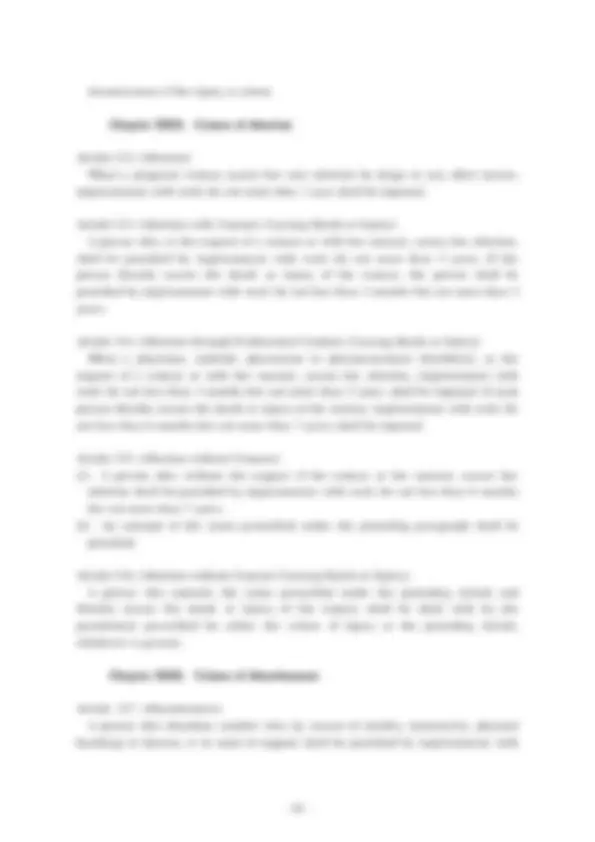
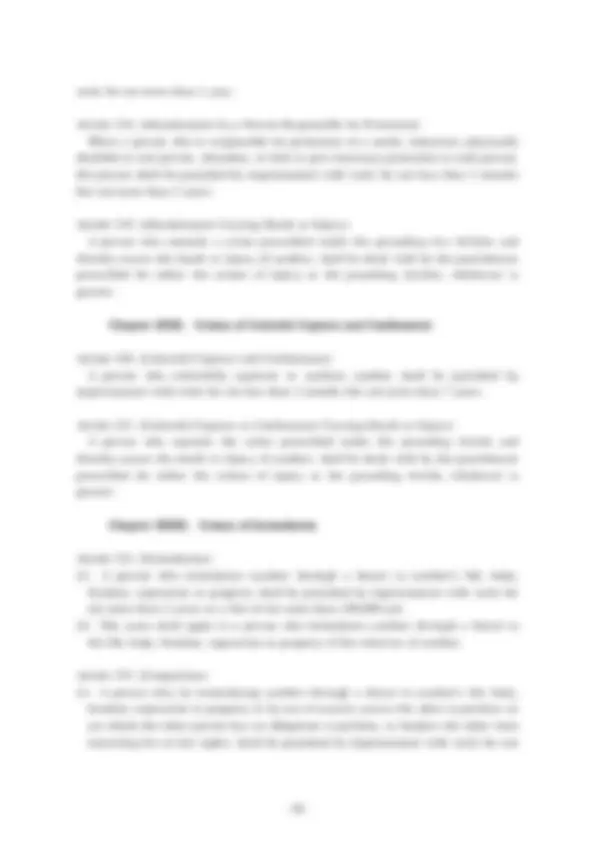
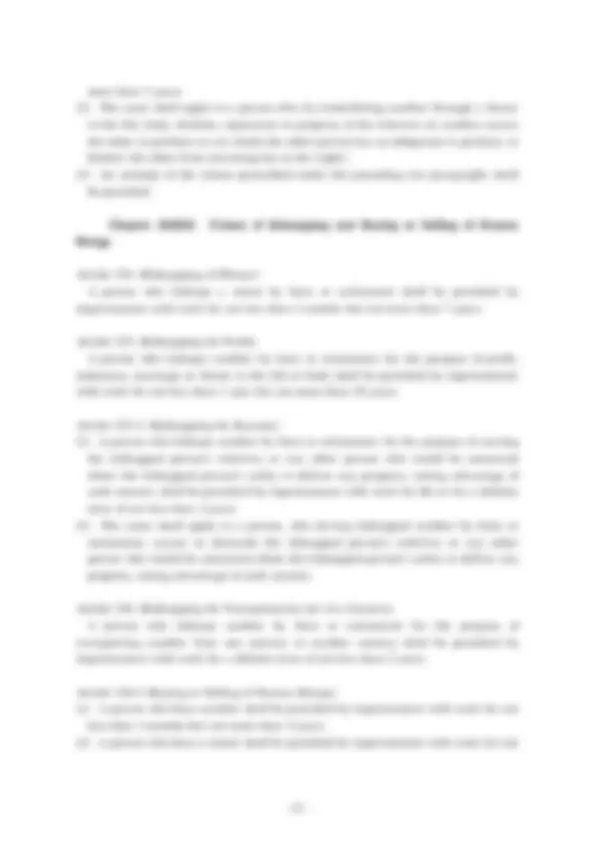
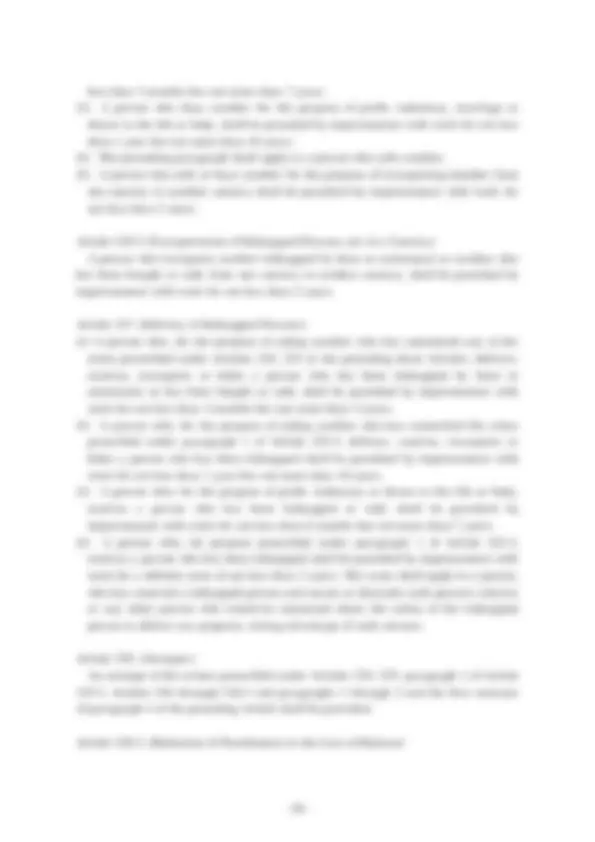
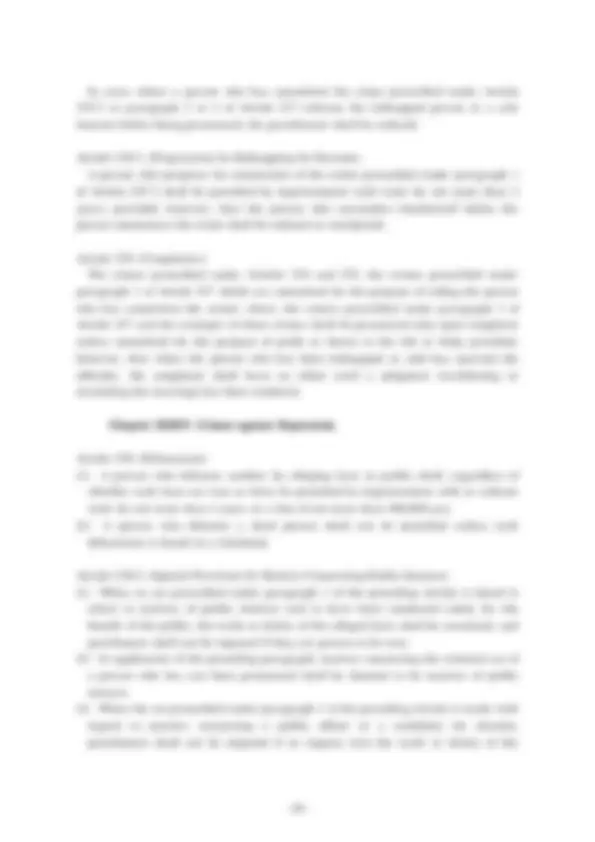
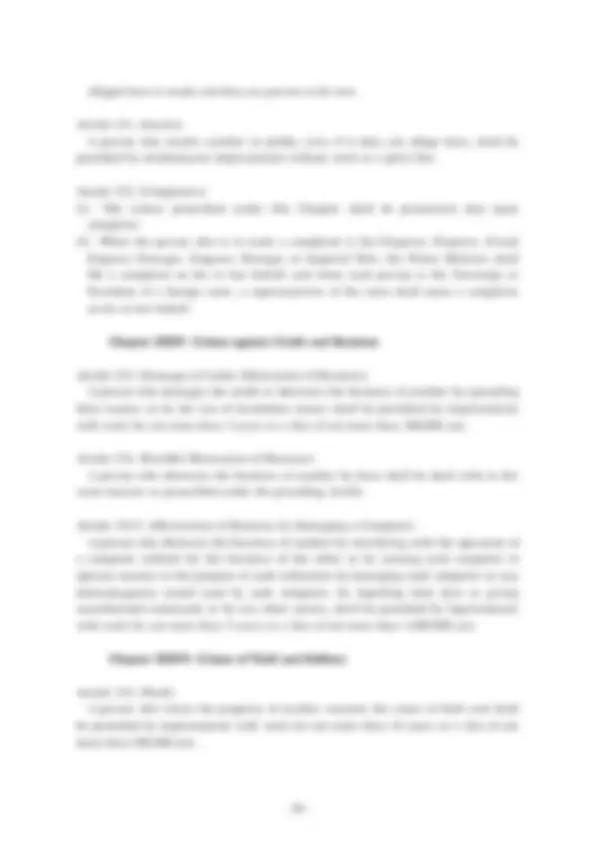
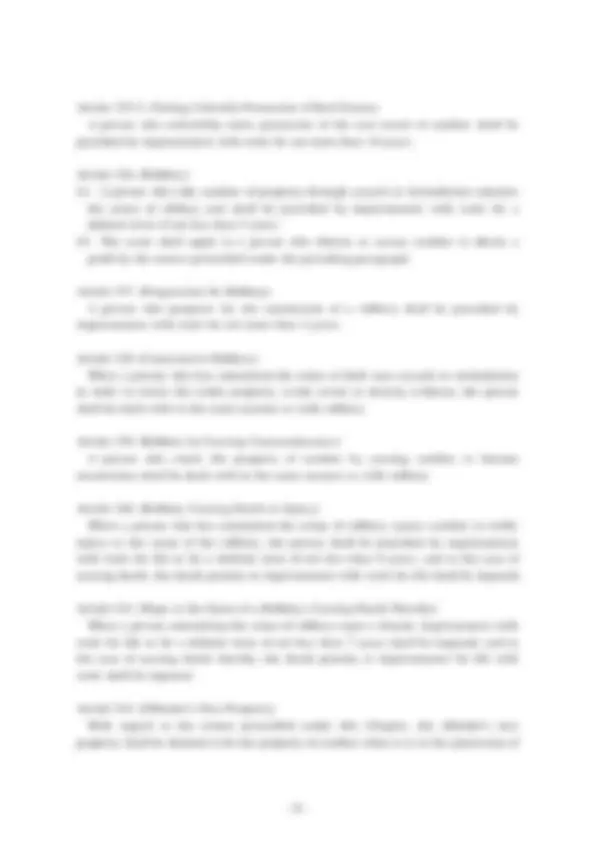
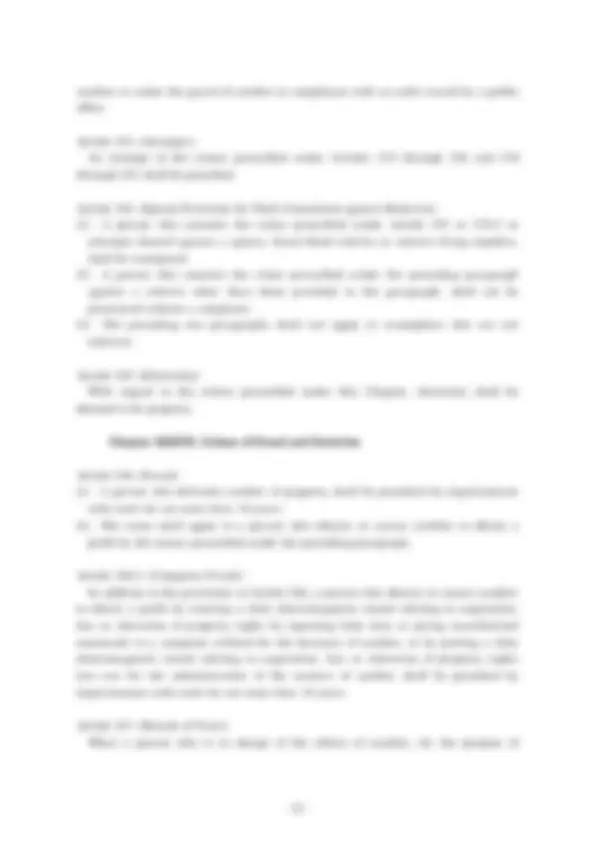
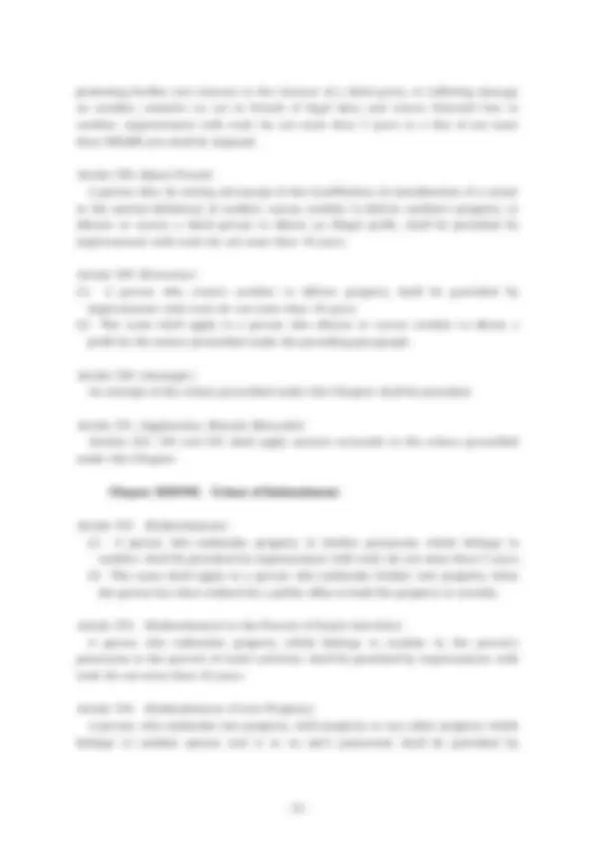
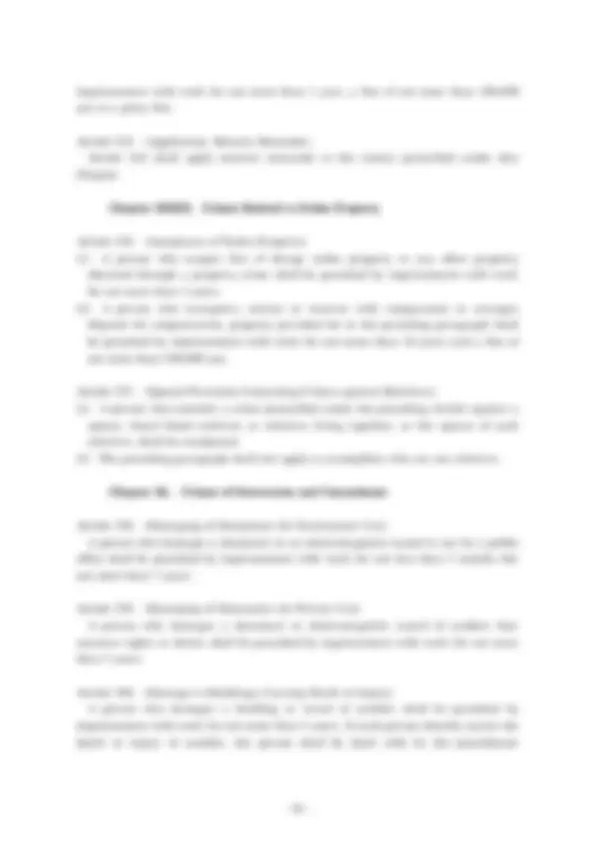
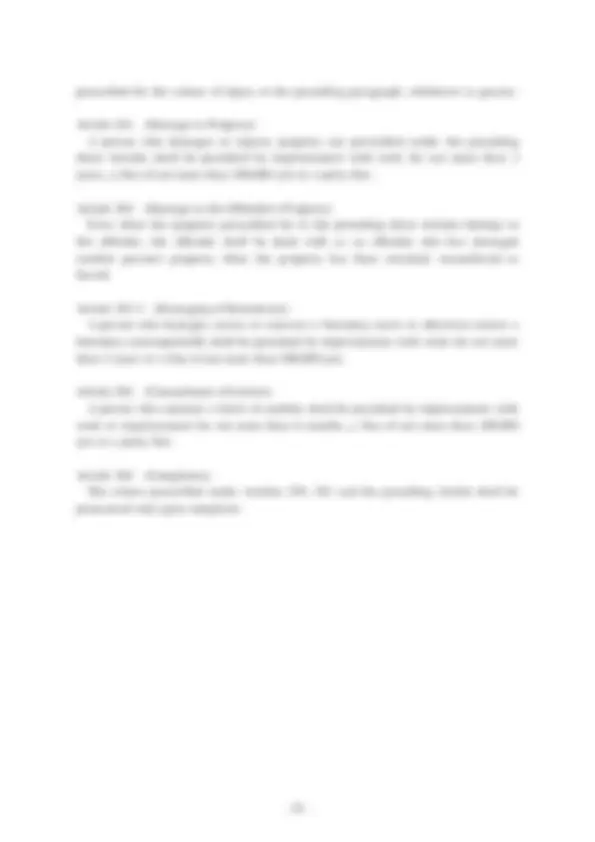


Study with the several resources on Docsity

Earn points by helping other students or get them with a premium plan


Prepare for your exams
Study with the several resources on Docsity

Earn points to download
Earn points by helping other students or get them with a premium plan
Community
Ask the community for help and clear up your study doubts
Discover the best universities in your country according to Docsity users
Free resources
Download our free guides on studying techniques, anxiety management strategies, and thesis advice from Docsity tutors
Various provisions of the Japanese Penal Code regarding imprisonment with and without work, the interruption of prescription, and related crimes such as intimidation of witnesses, damage to objects, and counterfeiting. It includes information on the maximum terms of punishment for different crimes and the circumstances under which the execution of a sentence may be suspended.
Typology: Study notes
1 / 55

This page cannot be seen from the preview
Don't miss anything!
















































This English translation of the Penal Code has been prepared (up to the revisions of Act No. 36 of 2006(Effective May 28, 2006)) in compliance with the Standard Bilingual Dictionary (March 2006 edition). This is an unofficial translation. Only the original Japanese texts of laws and regulations have legal effect, and the translations are to be used solely as reference material to aid in the understanding of Japanese laws and regulations. The Government of Japan shall not be responsible for the accuracy, reliability or currency of the legislative material provided in this Website, or for any consequence resulting from use of the information in this Website. For all purposes of interpreting and applying law to any legal issue or dispute, users should consult the original Japanese texts published in the Official Gazette.
Chapter I. Scope of Application
Article 1. (Crimes Committed within Japan) (1) This Code shall apply to anyone who commits a crime within the territory of Japan. (2) The same shall apply to anyone who commits a crime on board a Japanese vessel or aircraft outside the territory of Japan.
Article 2. (Crimes Committed outside Japan) This Code shall apply to anyone who commits one of the following crimes outside the territory of Japan: (i) Deleted; (ii) The crimes proscribed under Articles 77 through 79 (Insurrection; Preparations; Plots; Accessoryship to Insurrection); (iii) The crimes proscribed under Articles 81 (Instigation of Foreign Aggression), 82 (Assistance to the Enemy), 87 (Attempts) and 88 (Preparation; Plots); (iv) The crime proscribed under Article 148 (Counterfeiting of Currency and Uttering of Counterfeit Currency) as well as an attempt thereof; (v) The crimes proscribed under Article 154 (Counterfeiting of Imperial or State Documents), 155 (Counterfeiting of Official Documents), 157 (False Entries in the Original of Notarized Deeds) and 158 (Uttering of Counterfeit Official Documents), and the crime concerning an electromagnetic record which should
be created by a public office or a public official in Article 161-2 (Unauthorized Creation of Electromagnetic Records); (vi) The crimes proscribed under Articles 162 (Counterfeiting of Securities) and 163 (Uttering of Counterfeit Securities); (vii) The crimes proscribed under Articles 163-2 through 163-5 (Unauthorized Creation of Payment Cards with an Electromagnetic Record; Possession of Payment Cards with an Unauthorized Electromagnetic Record; Preparation for Unauthorized Creation of Payment Cards with an Electromagnetic Record; Attempts) (viii) The crimes proscribed under Articles 164 through 166 (Counterfeiting or Unauthorized Use of the Imperial Seal; Counterfeiting or Unauthorized Use of Official Seals; Counterfeiting or Unauthorized Use of Official Marks) as well as an attempt of the crimes proscribed under paragraph 2 of Article 164, paragraph 2 of Article 165, and paragraph 2 of Article 166.
Article 3. (Crimes Committed by Japanese Nationals outside Japan) This Code shall apply to any Japanese national who commits one of the following crimes outside the territory of Japan: (i) The crimes proscribed under Article 108 (Arson of Inhabited Buildings) and paragraph 1 of Article 109 (Arson of Uninhabited Buildings), and other crimes which shall be dealt with in the same manner as the preceding crimes provided therein, as well as an attempt of the above-mentioned crimes; (ii) The crime proscribed under Article 119 (Damage to Inhabited Buildings by Flood); (iii) The crimes proscribed under Articles 159 through 161 (Counterfeiting of Private Documents; Falsifying of Medical Certificates; Utterance of Counterfeit Private Documents) and the crime regarding electromagnetic records in Article 161-2 except that which shall fall within subparagraph (5) of the preceding Article; (iv) The crimes proscribed under Article 167 (Counterfeiting or Unauthorized Use of Private Seals) and an attempt of the crimes proscribed under paragraph 2 of that Article; (v) The crimes proscribed under Articles 176 through 179 (Forcible Indecency; Rape; Quasi Forcible Indecency and Quasi Rape; Gang Rape; Attempts), 181 (Forcible Indecency Causing Death or Injury) and 184 (Bigamy); (vi) The crime proscribed under Article 199 (Homicide) and attempt thereof; (vii) The crimes proscribed under Articles 204 (Injury) and 205 (Injury Causing Death); (viii) The crimes proscribed under Articles 214 through 216 (Abortion through Professional Conduct; Causing Death or Injury thereof; Abortion without
(vi) The crimes proscribed under Articles 236 (Robbery), 238 through 241 (Constructive Robbery; Robbery through Causing Unconsciousness; Death or Injury on the Occasion of Robbery; Rape on the Scene of Robbery; Causing Death Thereby), and 243 (Attempts).
Article 4. (Crimes Committed by Public Officials outside Japan) This Code shall apply to any public official of Japan who commits one of the following crimes outside the territory of Japan: (i) The crime proscribed under Article 101(Assistance in Escape by a Guard) as well as an attempt thereof; (ii) The crime proscribed under Article 156 (Making of False Official Documents); (iii) The crimes proscribed under Article 193 (Abuse of Authority by Public Officials), paragraph 2 of Article 195 (Assault and Cruelty by Special Public Officials) and Articles 197 through 197-4 (Acceptance of Bribes; Acceptance on a Request; Acceptance in Advance; Passing of Bribes to a Third Party; Aggravated Acceptance; Acceptance after Resignation of Office; Acceptance for Exertion of Influence), and the crime of causing death or injury through commission of the crime proscribed under paragraph 2 of Article 195.
Article 4-2. (Crimes Committed outside Japan Governed by a Treaty) In addition to the provisions of Article 2 through the preceding Article, this Code shall also apply to anyone who commits outside the territory of Japan those crimes proscribed under Part II which are governed by a treaty even if committed outside the territory of Japan.
Article 5. (Effect of Foreign Judgments) Even when a final and binding decision has been rendered by a foreign judiciary against the criminal act of a person, it shall not preclude further punishment in Japan with regard to the same act; provided, however, that when the person has already served either the whole or part of the punishment abroad, execution of the punishment shall be mitigated or remitted.
Article 6. (Change in Punishments) When a punishment is changed by law after the commission of a crime, the lesser punishment shall be applied.
Article 7. (Definition) (1) The term "public officer" as used in this Code shall mean a national or local government official, a member of an assembly or committee, or other employees engaged in the performance of public duties in accordance with laws and
regulations. (2) The term "public office" as used in this Code shall mean an office where public officers perform their duties.
Article 7-2. The term "electromagnetic record" as used in this Code shall mean any record which is produced by electronic, magnetic or any other means unrecognizable by natural perceptive functions and is used for data-processing by a computer.
Article 8. (Application of General Provisions) The general provisions of this Part shall also apply to crimes for which punishments are provided by other laws and regulations, except as otherwise provided in such laws and regulations.
Chapter II. Punishments
Article 9. (Categories of Punishments) The principal punishments are categorized as the death penalty, imprisonment with work, imprisonment without work, fine, misdemeanor detention and petty fine, with confiscation as a supplementary punishment.
Article 10. (Gravity of Punishments) (1) The order of gravity of the principal punishments shall be according to the order in which they are provided for in the preceding Article; provided, however, that imprisonment without work for life is greater than imprisonment with work for a definite term, and imprisonment without work for a definite term is greater than imprisonment with work for a definite term when the maximum term prescribed for the former exceeds the term by twice as much as that prescribed for the latter. (2) Between punishments of the same class, the punishment prescribed with a higher maximum term or amount is greater; and when the maximum terms or amounts are equal, the punishment prescribed with the higher minimum term or amount is greater. (3) Between death penalties or punishments of the same class which have equal maximum and minimum terms or amounts, the order of gravity shall be determined in light of the circumstances of the crimes.
Article 11. (Death Penalty) (1) The Death penalty shall be executed by hanging at a penal institution. (2) A person who has been sentenced to the death penalty shall be detained in a jail until its execution.
petty fines are imposed cumulatively, the term of detention may not exceed 60 days. (4) When rendering a sentence of a fine or petty fine the court shall simultaneously determine and render a term of detention in a workhouse in the case of default of the full payment thereof. (5) Except with the consent of the sentenced person, confinement for default of a fine may not be executed within 30 days from the time when the decision has become final and binding, and confinement for default of a petty fine may not be executed within 10 days from the time when the decision has become final and binding. (6) When a person sentenced to a fine or petty fine has made payment of part of the fine, the term of confinement shall be calculated by dividing the amount of the unpaid payment by the amount for one day (a remainder less than one day is deemed as one whole day) reduced by a period of days in proportion to the amount of payment made for the fine or petty fine imposed.
Article 19. (Confiscation) (1) The following objects may be confiscated: (i) An object which is a component of a criminal act; (ii) An object used or intended for use in the commission of a criminal act; (iii) An object produced or acquired by means of a criminal act or an object acquired as reward for a criminal act; (iv) An object received in exchange for the object set forth in the preceding subparagraphs. (2) An object set forth in the preceding paragraph may be confiscated only if it does not belong to a person other than the criminal; provided, however, that it may be confiscated when a person other than the criminal acquires the object after the crime with knowledge of the applicability of the preceding subparagraphs.
Article 19-2. (Collection of a Sum of Equivalent Value) When the whole or part of the object prescribed in subparagraphs (3) and (4) of paragraph 1 of Article 19 cannot be confiscated, a sum of money equivalent thereto may be collected.
Article 20. (Restrictions on Confiscation) There may be no confiscation with regard to crimes punishable only by misdemeanor imprisonment without work or a petty fine, except where specifically so provided; provided, however, that this shall not apply to the object set forth in subparagraph (i) of paragraph 1 of Article 19.
Article 21. (Inclusion of Period of Pre-Sentencing Detention into Sentence)
The days spent in pre-sentencing detention may be included in whole or in part into the sentence imposed.
Chapter III. (Calculation of the Period of Time)
Article 22. (Calculation of the Period of Time) When a term is expressed in months or years, it is to be calculated in accordance with the calendar.
Article 23. (Calculation of the Term of Imprisonment) (1) The term of imprisonment shall be calculated from the day on which such sentence becomes final and binding. (2) The days when the criminal is not actually confined shall not be included into the term of punishment, even if they are after the sentence has become final and binding.
Article 24. (First Day and Last Day of Imprisonment) (1) The first day of imprisonment shall be calculated as one whole day regardless of the number of hours actually imprisoned. The same shall apply to the first day of the period of prescription. (2) Final release from imprisonment shall take place on the day after completion of the term of imprisonment.
Chapter IV. Suspension of Execution of the Sentence
Article 25. (Suspension of Execution of the Sentence) (1) When any one of the following persons has been sentenced to imprisonment with or without work for not more than 3 years or a fine of not more than 500,000 yen, execution of the sentence may, in light of circumstances, be suspended for a period of not less than 1 year but not more than 5 years from the day on which the sentence becomes final and binding: (i) A person not previously sentenced to imprisonment without work or a greater punishment; (ii) A person who, although previously sentenced to imprisonment without work or a greater punishment, has not subsequently been sentenced to imprisonment without work or a greater punishment within five years from the day on which execution of the former punishment was completed or remitted. (2) When a person, who has been sentenced to imprisonment without work or a greater punishment and has been granted suspension of execution of the sentence, is sentenced subsequently to imprisonment with or without work for not more than
(iii) When it is discovered that, before a person was granted suspension for a crime, the person had been sentenced to imprisonment without work or a greater punishment for another crime and granted suspension of execution of such sentence.
Article 26-3. (Revocation of Concurrent Suspensions of Executions of Sentences) When a suspension of execution of sentence to imprisonment without work or a greater punishment is revoked pursuant to the provision of the preceding two Articles, the concurrent suspension of execution of another sentence to imprisonment without work or a greater punishment shall also be revoked.
Article 27. (Effect of Elapsing of Period of Suspension) When a period of suspension progresses without rescission, the sentence shall cease to be effective.
Chapter V. Parole
Article 28. (Parole) When a person sentenced to imprisonment with or without work evinces signs of substantial reformation, the person may be paroled by a disposition of a government agency after that person has served one-third of the definite term sentenced or 10 years in the case of a life imprisonment.
Article 29. (Revocation of Parole) (1) Parole may be revoked in the following cases: (i) When a further crime is committed within the period of parole and a fine or greater punishment is imposed for the crime; (ii) When a fine or greater punishment is imposed for a crime committed before the parole; (iii) When a fine or greater punishment is imposed for another crime before the parole is implemented; (iv) When the person fails to observe any of the conditions of the parole. (2) When a parole is revoked, the number of days during the parole shall not be included into the term of imprisonment.
Article 30. (Provisional Release) (1) A person under misdemeanor imprisonment without work may be provisionally released by a disposition of a government agency at any time when circumstances so warrant. (2) The same shall apply to a person under detention owing to payment default of a
fine or petty fine.
Chapter VI. Prescription and Extinction of Punishment
Article 31. (Prescription of Sentence) Prescription shall have the effect of remitting the sentence of a person who has been sentenced to punishment.
Article 32. (Period of Prescription) Prescription takes effect when a punishment has not been executed within any of the following periods after a sentence has become final and binding: (i) Thirty years for the death penalty; (ii) Twenty years for life imprisonment with or without work; (iii) Fifteen years for imprisonment with or without work for a definite term of 10 years or more; (iv) Ten years for imprisonment with or without work for a definite term of 3 years or more but less than 10 years; (v) Five years for imprisonment with or without work for a definite term of less than 3 years; (vi) Three years for a fine; (vii) One year for a misdemeanor imprisonment without work, a petty fine and confiscation.
Article 33. (Suspension of Prescription) Prescription shall not run while execution of the sentence is suspended or stayed in accordance with laws and regulations.
Article 34. (Interruption of Prescription) (1) The period which has run toward the prescription shall be interrupted when the sentenced person is in custody for the purpose of execution of the death penalty, imprisonment with or without work, or misdemeanor imprisonment without work. (2) The period which has run toward the prescription of a fine, petty fine or confiscation shall be interrupted when an act of execution takes place.
Article 34-2. (Extinction of Punishment) (1) When ten years have passed since a person completed the imprisonment without work or a greater punishment or the person had such punishment remitted without another sentence of a fine or a greater punishment being imposed, the sentence shall cease to have effect. The same shall apply when five years have passed since a person completed the execution of a fine or a lighter punishment or
of the facts constituting a greater crime, the person shall not be punished for the greater crime. (3) Lacking knowledge of law shall not be deemed lacking the intention to commit a crime; provided, however, that punishment may be reduced in light of the circumstances.
Article 39. (Insanity and Diminished Capacity) (1) An act of insanity is not punishable. (2) An act of diminished capacity shall lead to the punishment being reduced.
Article 40. Deleted.
Article 41. (Infancy) An act of a person less than 14 years of age is not punishable.
Article 42. (Surrender) (1) The punishment of a person who committed a crime and surrendered him/herself before being identified as a suspect by an investigative authority may be reduced. (2) With respect to a crime to be prosecuted only upon complaint, the same shall apply to a person who surrendered him/herself to a person with the right to make the complaint.
Chapter VIII. Attempts
Article 43. (Reduction or Exculpation of Punishments for Attempts) The punishment of a person who commences a crime without completing it may be reduced; provided, however, that voluntary abandonment of commission of the crime, shall lead to the punishment being reduced or the offender being exculpated.
Article 44. (Attempts) An attempt is punishable only when specifically so provided in the article concerned.
Chapter IX. Consolidated Punishments
Article 45. (Consolidated Punishments) Two or more crimes which have been committed but for which no judgment has yet become final and binding shall constitute crimes for consolidated punishment. When a judgment imposing imprisonment without work or a greater punishment becomes final and binding for a crime, only that crime and other crimes committed before
such judgment became final and binding shall constitute crimes for consolidated punishment.
Article 46. (Restriction on Cumulative Imposition of Punishments) (1) When a death penalty is rendered for one of the crimes for consolidated punishments, no other punishments except confiscation may be imposed. (2) When a punishment of life imprisonment with or without work is to be rendered for one of the crimes for consolidated punishment, no other punishment except a fine, petty fine and confiscation may be imposed.
Article 47. (Aggravation of Punishment) When the crimes for consolidated punishment include two or more crimes punishable by imprisonment with or without work for a definite term, the maximum term of the punishment to be imposed for such crimes shall be half as much again as the maximum term prescribed for the crime of the greatest punishment, but may not exceed the total of the maximum terms of the punishments prescribed for each of the crimes.
Article 48. (Cumulative Imposition of Fines) (1) A fine and other punishments shall be imposed cumulatively, except in the case prescribed for in paragraph 1 of Article 46. (2) The maximum amount of a fine to be imposed for a crime for consolidated punishment shall not exceed the total of the maximum amount of the fine prescribed for each crime.
Article 49. (Addition of Confiscation) (1) With respect to the crimes for consolidated punishment, even when confiscation is not imposed for the crime of the greatest punishment, confiscation may be imposed for the other crimes if there are grounds to do so. (2) Two or more confiscations shall be imposed cumulatively.
Article 50. (Unsentenced Crimes) When the punishment for one of the crimes for consolidated punishment has become final and binding, a punishment shall be rendered as to the other crimes.
Article 51. (Execution of Two or More Punishments Pertaining to Consolidated Punishments) (1) When two or more punishments have been rendered in regard to the crimes for consolidated punishment, the punishments shall be executed cumulatively; provided, however, that when the death penalty is to be executed, no other
which the execution of the death penalty sentence was remitted or, from the day on which the reduced sentence was completed or remitted after the death penalty was reduced to imprisonment with work, and the person is to be sentenced to imprisonment with work for a definite term. (3) When a person has been sentenced to consolidated punishment for crimes in any of which imprisonment with work is prescribed, but was not sentenced to imprisonment with work because the crime prescribing imprisonment with work was not the greatest, the person shall be deemed to have been sentenced to imprisonment with work in the application of provisions related to a second conviction.
Article 57. (Aggravated Punishments for a Second Conviction) The maximum term of punishment for a second conviction shall be twice the maximum term of imprisonment with work prescribed in relation to such crime.
Article 58. Deleted.
Article 59. (Third or Further Repeated Conviction) A person to be sentenced for a third or further conviction shall be dealt with as with the second conviction.
Chapter XI. Complicity
Article 60. (Co-Principals) Two or more persons who commit a crime in joint action are all principals.
Article 61. (Inducement) (1) A person who induces another to commit a crime shall be dealt with in sentencing as a principal. (2) The same shall apply to a person who induces another to induce.
Article 62. (Accessoryship) (1) A person who aids a principal is an accessory. (2) A person who induces an accessory shall be dealt with in sentencing as an accessory.
Article 63. (Reduced Punishment for Accessories) The punishment of an accessory shall be reduced from the punishment for the principal.
Article 64. (Exception of Punishment for Inducement and Accessoryship) A person who induces or aids a crime subject only to misdemeanor imprisonment without work or a petty fine shall not be punished for a crime except as otherwise specially provided.
Article 65. (Complicity and Status) (1) When a person collaborates in a criminal act in which the status of the criminal establishes the criminal's punishability, the person is an accomplice even without such status. (2) When the gravity of a punishment varies depending upon whether or not a criminal has a certain status, a normal punishment shall be imposed on a person without such status.
Chapter XII. Reduction of Punishment in Light of Extenuating Circumstances
Article 66. (Reduction of Punishment in Light of Extenuating Circumstances) Punishment may be reduced in light of the extenuating circumstances of a crime.
Article 67. (Statutory Aggravation or Reduction and Reduction in Light of Extenuating Circumstances) Even if the punishment is aggravated or reduced in accordance with a statute, it may be reduced in light of circumstances.
Chapter XIII. Rules for Aggravation and Reduction
Article 68. (Rules for Statutory Reduction) When there are one or more statutory grounds for reduction of punishment, the following rules shall apply: (i) When the death penalty is to be reduced, it shall be reduced to imprisonment with or without work either for life or for a definite term of not less than 10 years; (ii) When imprisonment with or without work for life is to be reduced, it shall be reduced to imprisonment with or without work for a definite term of not less than 7 years; (iii) When imprisonment with or without work for a definite term is to be reduced, its maximum and minimum term of punishment shall be reduced by one half; (iv) When a fine is to be reduced, its maximum and minimum amount shall be reduced by one half; (v) When a misdemeanor imprisonment without work is to be reduced, the maximum term shall be reduced by one half;
(ii) A person who participates in a plot or directs a mob shall be punished by imprisonment without work either for life or for a definite term of not less than 3 years; a person who performs other leading functions shall be punished by imprisonment without work for not less than 1 year but not more than 10 years; (iii) A person who merely follows others or otherwise merely joins in the riot shall be punished by imprisonment without work for not more than 3 years. (2) An attempt of the crime proscribed under the preceding paragraph shall be punished; provided, however, that the same shall not apply to a person provided for in subparagraph (3) of the same paragraph.
Article 78. (Preparations; Plots) A person who prepares for or plots an insurrection shall be punished by imprisonment without work for not less than 1 year but not more than 10 years.
Article 79. (Accessoryship to Insurrection) A person who aids the commission of any of the crimes proscribed under the preceding two Articles by the supply of arms, funds or food, or by any other act, shall be punished by imprisonment without work for not more than 7 years.
Article 80. (Surrender) A person who, after committing any of the crimes proscribed under the preceding two Articles, surrenders him/herself before the act of riot is performed, shall be exculpated.
Chapter III. Crimes Related to Foreign Aggression
Article 81. (Instigation of Foreign Aggression) A person who agrees with a foreign state and thereby causes the state to exercise armed force against Japan shall be punished by the death penalty.
Article 82. (Assistance to the Enemy) A person who, when a foreign state exercises armed force against Japan, sides with the state by engaging in the military service of such state, or otherwise affords military advantage to such state, shall be punished by the death penalty or imprisonment with work either for life or for a definite term of not less than 2 years.
Article 83, 84, 85 and 86. Deleted.
Article 87. (Attempts) An Attempt of any of the crimes proscribed under Articles 81 and 82 shall be
punished.
Article 88. (Preparations; Plots) A person who prepares for or plots any of the crimes proscribed under Articles 81 and 82 shall be punished by imprisonment with work for not less than 1 year but not more than 10 years.
Article 89. Deleted.
Chapter IV. Crimes Related to Foreign Relations
Article 90 and 91. Deleted.
Article 92. (Damage of Foreign National Flag) (1) A person who, for the purpose of insulting a foreign state, damages, removes or defiles the national flag or other national emblem of the state shall be punished by imprisonment with work for not more than 2 years or a fine of not more than 200,000 yen. (2) The crime proscribed under the preceding paragraph shall not be prosecuted without the request of the government of such state.
Article 93. (Preparations or Plots for Private War) A person who prepares or plots to wage war privately upon a foreign state shall be punished by imprisonment without work for not less than 3 months but not more than 5 years; provided, however, that the person who surrenders him/herself shall be exculpated.
Article 94. (Violations of Neutrality Orders) A person who violates an order of neutrality in a war between foreign states shall be punished by imprisonment without work for not more than 3 years or a fine of not more than 500,000 yen.
Chapter V. Crimes of Obstruction of Performance of Public Duty Article 95. (Obstructing or Compelling Performance of Public Duty) (1) A person who commits an act of assault or intimidation against a public officer in the performance of public duty shall be punished by imprisonment with or without work for not more than 3 years or a fine of not more than 500,000 yen. (2) The same shall apply to a person who commits an act of assault or intimidation against a public officer in order to cause the official to perform or not to perform the act as an official or in order to cause the official to resign.